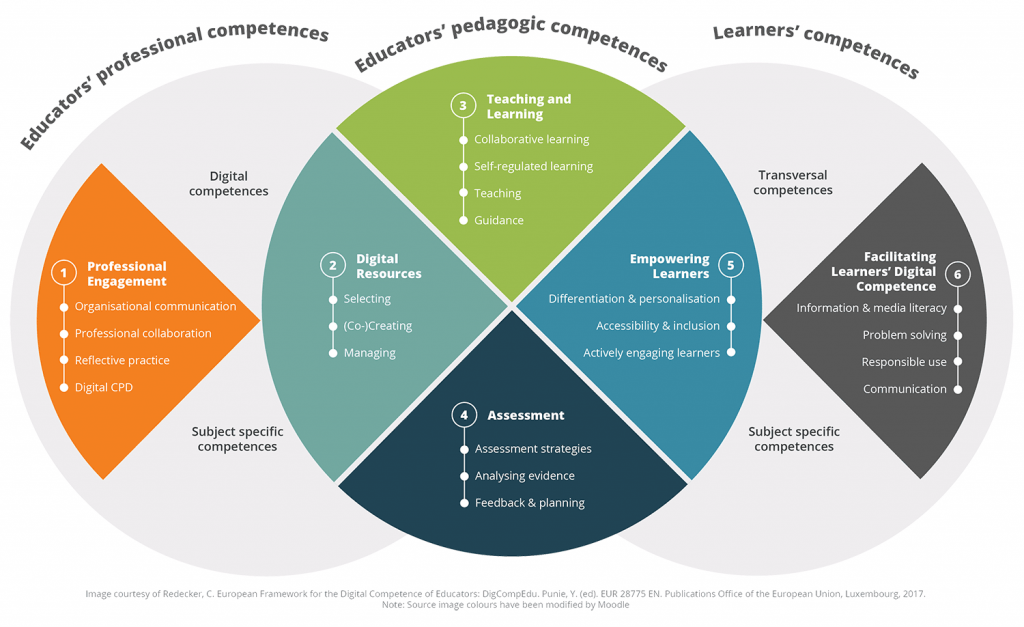Digital competence – develop teaching skills for online learning
In your role as an educator you have the power to inspire, motivate, encourage and support your learners. You have the experience, you are a subject matter expert, but are you leveraging the tools available to you to make online learning an engaging and fulfilling experience for your students? Lets look at teaching in the context of digital transformation.
Develop your digital competence
Pedagogy first, technology second
Whether you are offering hybrid learning, blended learning or 100% online learning to your students, the foundation of a great online learning experience will always be more than just software tools. However, these tools do provide a vehicle to reach and engage with your audience in ways that are familiar to them in their day to day lives. It is up to you, as as an educator, to use the tools to create great experiences around your subject matter. It requires digital competence or online pedagogy.
Moodle Academy
Our technology partner, Moodle, recently launched the Moodle Academy, to provided a learning hub for the global Moodle community. It provides learning pathways that take educators from their very first steps into teaching with Moodle to being certified as an expert Moodle online educator and instructional designer. These pathways culminate in the Moodle Educator Certification program based on the widely used and accepted European Framework for the Digital Competence for Educators (DigCompEdu).
Digital competence framework for educators
Understanding DigCompEdu
DigCompEdu is a scientifically sound framework that supports the development of educator-specific digital competences. Developed by The European Commission’s science and knowledge service, DigCompEdu details 22 competences organised in six areas.

The focus is not on technical skills. Rather, the framework aims to detail how digital technologies can be used to enhance and innovate education and training:
- Area 1 focuses on the professional environment and how to use digital technologies to enhance communication with learners and their families; and encourage professional collaboration and reflection.
- Area 2 focuses on sourcing, creating and sharing digital resources, in particular modifying and building on existing openly-licensed resources. This area encourages educators to consider the specific learning objective, context, pedagogical approach, and learner group when designing digital resources and planning their use.
- Area 3 concentrates on managing and orchestrating the use of digital tools in teaching and learning. This encourages educators to enhance their interaction with learners, foster collaborative learning and improve the effectiveness of their teaching strategies by experimenting with new pedagogical methods.
- Area 4 covers using digital tools and strategies to enhance formative and summative assessment through a diversity of assessment formats and approaches. This includes using digital technologies to provide targeted and timely feedback to learners and the analysis of evidence on learner performance to inform future teaching strategies.
- Area 5 focuses on the use of digital tools to foster learners’ active and creative engagement with a subject matter including accommodating diverse learning preferences at different levels and speeds, and ensuring accessibility of learning resources and activities.
- Area 6 centres on facilitating the development of learners’ competency in safely accessing and assessing information in digital environments; using technology for communication, collaboration and participation, and expressing themselves through creating digital content in different formats.
Areas 2 to 5 form the pedagogic core of the framework. They detail the competences educators need to possess to foster effective, inclusive and innovative learning strategies, using digital tools.
Moodle Educator Certificate

The DigCompEdu provides a scientifically backed framework for you, as an educator, to develop your online pedagogy skills. It will help you become a more accomplished, effective and engaging online educator or learning and development professional … a win for you and your learners.
Complete your MEC with Catalyst IT
If you are a Moodle educator who has experience in teaching or training with Moodle LMS or Moodle Workplace, complete a short quiz and find out more about the Moodle Educator Certification based on the DigCompEdu.

